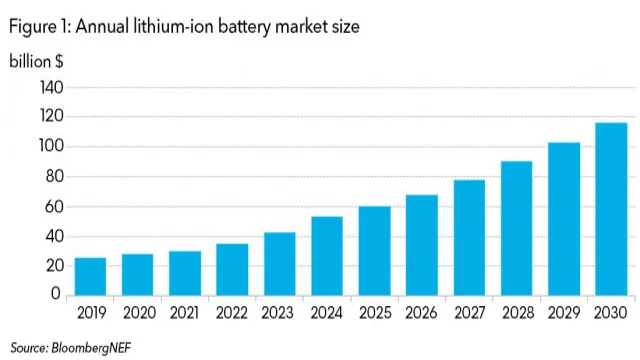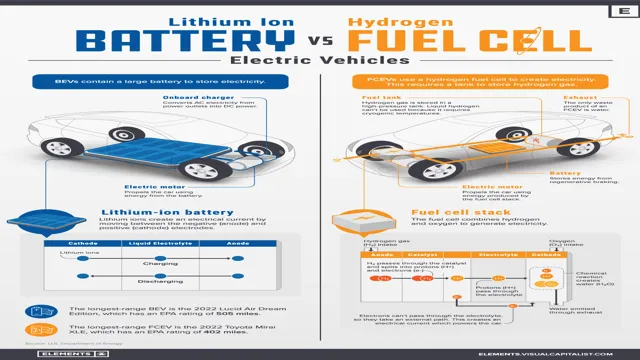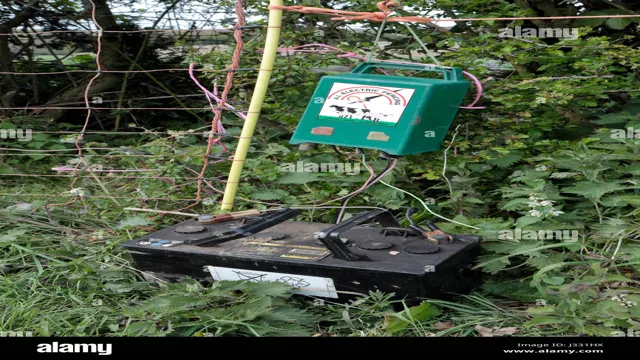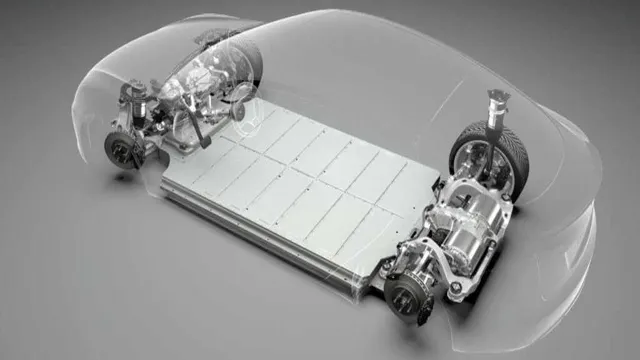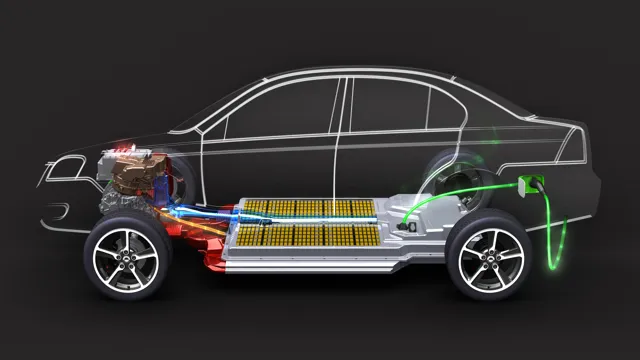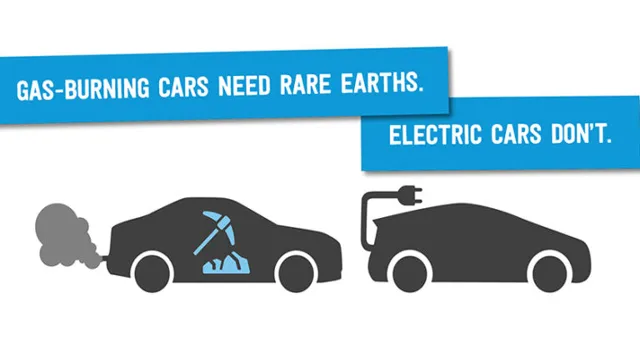Unveiling the Truth behind Average Electric Car Battery Capacity in kWh
Electric cars have surged in popularity in recent years, thanks in part to the growing concern over climate change and the need to reduce carbon emissions. But one of the biggest questions people have about these environmentally-friendly vehicles is how far they can go on a single battery charge. The answer to this largely depends on the capacity of the battery, which is typically measured in kilowatt-hours (kWh).
But what is the average electric car battery kWh? To put it simply, the average electric car battery size is around 60 kWh, although this can vary widely depending on the make and model of the car. For example, Tesla’s Model S has a battery capacity of up to 100 kWh, while more affordable options like the Nissan Leaf and the Chevrolet Bolt have smaller batteries of around 40 kWh. The battery capacity is important when it comes to determining the range of an electric car, which is the distance it can travel on a single charge.
Generally speaking, the higher the battery capacity, the greater the range. This is because the amount of energy the battery can store determines how long the vehicle can operate before needing a recharge. Of course, there are a number of other factors that can impact the range of an electric car, including driving style, weather conditions, and even the type of terrain you’re driving on.
But knowing the average electric car battery kWh is a good starting point when it comes to understanding how far these vehicles can go on a single charge. Whether you’re considering buying an electric car or just curious about how they work, understanding the role of the battery is essential to gaining a deeper understanding of this game-changing technology.
Explaining the Basics of Electric Car Batteries
When it comes to electric car batteries, understanding their capacity is key. The average electric car battery has a capacity of around 60-100 kWh, with higher-end models potentially reaching up to 200 kWh. But what does this mean in terms of range? Well, a 60 kWh battery could give you around 220-250 miles on a single charge, while a 100 kWh battery could push that up to 350-400 miles.
Of course, there are many factors that can affect range, such as the terrain, driving style, and weather conditions. It’s important to note that the capacity of an electric car battery will gradually decrease over time, too. However, with regular maintenance and careful use, an electric car battery can still provide reliable and efficient power for many years to come.
What Is a KWh Anyway?
Electric car batteries are becoming increasingly popular, but understanding the basics of their power can be confusing. One term that’s commonly used is kWh, or kilowatt-hour. Essentially, a kilowatt-hour is a unit of energy.
It represents the amount of energy used by a 1,000-watt appliance for one hour. In electric cars, the battery capacity is measured in kWh, indicating how much energy the battery can store when fully charged. For example, if a car has a 60 kWh battery, it can store enough energy to power a 1,000-watt appliance for 60 hours or a 10,000-watt appliance for six hours.
Knowing the battery capacity can help drivers estimate the range of their electric vehicle on a single charge, as well as the cost of charging it. Ultimately, kWh is an important concept to understand when it comes to electric car batteries.
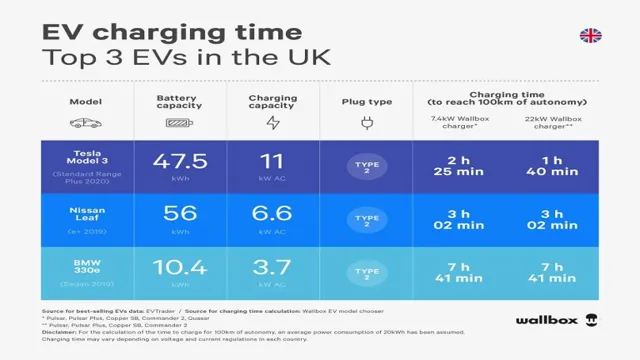
How Are Electric Car Batteries Measured?
Electric car batteries have become more sophisticated over time and come in different sizes and power levels. The capacity of an electric car battery is measured in kilowatt-hours (kWh), which is a measure of energy, rather than power. A battery with a higher kWh rating will provide a longer driving range, but it will also take longer to charge.
For instance, a 60kWh battery can take around 8 hours to charge from a standard 240-volt outlet. Other factors like the car’s weight, weather conditions, and driving habits also affect the battery life and driving range. Manufacturers test car batteries under specific conditions and provide an estimated driving range, but the actual range may vary depending on how and where the car is driven.
Therefore, it’s essential to keep the battery charged, maintain it properly and drive in a way that maximizes the energy efficiency to get the most out of an electric car.
Breaking Down the Average Electric Car Battery Capacity
When it comes to electric cars, a crucial component to consider is the battery capacity. The average electric car battery capacity is measured in kilowatt-hours (kWh), and determines how far the car can travel between charges. Currently, the average electric car battery capacity ranges from around 40-100 kWh, with larger batteries typically offering a longer driving range.
However, it’s important to note that the actual range may vary based on factors such as weather, driving habits, and terrain. It’s essential to choose a battery size that suits your specific needs, whether you require a car for daily commuting or longer trips. As technology continues to improve, electric car batteries are becoming more efficient and affordable, making them a viable alternative to traditional gasoline-powered vehicles.
The Range of KWh in Electric Cars
The range of KWh in electric cars can vary greatly depending on the model and make. The battery capacity is a key factor in determining the range of an electric car, and the average battery capacity of an electric car is growing year by year. On average, most electric cars have a battery capacity of around 60 KWh, which can provide a driving range of up to 200 miles on a single charge.
However, there are now many electric car models with battery capacities of over 100 KWh, which can provide a driving range of up to 400 miles or more on a single charge. Of course, the range of an electric car will depend on many other factors such as driving style, terrain, and weather conditions, so it is always best to check the manufacturer’s specifications and real-world tests before making a decision. Overall, the battery capacity of electric cars is a crucial consideration for anyone looking to switch to electric vehicles and understanding the average capacity can help in making an informed decision.
Factors That Affect Electric Car Battery Capacity
Electric Car Battery Capacity When it comes to electric cars, battery capacity is a crucial factor in determining how far you can travel before needing to recharge. The average electric car battery capacity ranges from 40 kWh to 100 kWh, with higher-end models having larger capacities. The capacity is determined by the number of battery cells and their energy density.
However, there are several factors that can affect the capacity of an electric car battery, including temperature, age, and driving habits. Extreme temperatures can cause the battery to lose its capacity over time, while older batteries will naturally deteriorate and lose ability. Similarly, harsh driving habits such as frequent rapid acceleration or high-speed driving can also reduce battery capacity more quickly.
By taking care of your electric car battery and adjusting your driving habits accordingly, you can maximize your battery capacity and get the most out of your electric vehicle.
Examples of Top Electric Cars and Their Battery KWh
Electric car battery capacity The battery capacity of electric cars varies from model to model. The most common measurement of battery capacity is in kilowatt-hours (kWh). Most electric cars have batteries ranging from 30 kWh to 100 kWh.
The Nissan Leaf, for example, has a 40-kWh battery, while the Tesla Model S has a 100-kWh battery. The battery capacity of an electric car determines its maximum range. A car with a larger battery will have a longer range, but it also means the car will be heavier and more expensive.
It is important to note that the battery capacity does not necessarily mean better performance. Some cars with smaller batteries can still perform just as well as those with larger batteries. When shopping for an electric car, it is important to consider your driving needs and find a car with the right battery capacity for you.
Why KWh Matters When Choosing an Electric Car
When looking at electric cars, one important factor to consider is the battery’s kilowatt-hour (kWh) rating. This refers to the amount of energy the battery can store, and can vary widely from car to car. So why does this matter? Put simply, a higher kWh rating means a longer driving range on a single charge.
For example, the average electric car battery has a kWh rating of around 60-80. However, some newer models offer up to 100 or even 150 kWh. This means they can go much further on a single charge, making them better for longer trips or more frequent use.
Of course, a higher kWh rating also usually means a higher price tag, so it’s important to weigh the benefits against the cost. Overall, though, if you want a car that can take you further on a single charge, paying attention to the kWh rating is a crucial step in choosing the right electric vehicle.
Impact on Driving Range and Performance
When it comes to purchasing an electric car, the kilowatt-hour (kWh) rating is a crucial metric to consider. The kWh rating determines the amount of energy that the car’s battery can store and can directly affect its driving range and performance. Simply put, the higher the kWh rating, the farther the car can travel on a single charge.
For instance, a car with a 40 kWh battery may have a range of around 150 miles, while a 60 kWh battery may offer a range closer to 230 miles. Additionally, a higher kWh rating can also lead to better acceleration and overall performance. It’s important to keep in mind that higher kWh ratings may come with a higher price tag, but it can also lead to a more satisfying driving experience and more peace of mind on long trips.
So, if you’re in the market for an electric car, make sure to pay close attention to the kWh rating in order to get the driving range and performance that fits your lifestyle.
How Battery KWh Affects Charging Time
When it comes to choosing an electric car, the KWh (kilowatt-hour) rating of the battery is an important factor to consider. The KWh rating of a battery determines how much energy it can store. The higher the KWh rating, the longer the car can go on a single charge.
However, KWh ratings also affect charging time. A battery with a higher KWh rating will take longer to charge than a battery with a lower KWh rating. It’s like filling up a gas tank; the bigger the tank, the longer it takes to fill.
So, if you want a car with a larger battery and longer driving range, you may have to wait longer to charge it. It’s important to keep this in mind when choosing an electric car, as it can impact your daily routine and travel plans. Overall, a higher KWh rating may be worth the longer charge time if it means longer driving range and more convenience in the long run.
Conclusion: How to Choose an Electric Car Based on Its Battery Capacity
To sum it up, the average electric car battery kwh is the equivalent of a superhero’s power source. It’s the heart of the vehicle and the key to driving towards a more sustainable future. So next time you charge up your electric car, remember that you’re harnessing the power of innovation and playing your part in saving the planet.
With great battery power comes great responsibility!”
FAQs
What is the average electric car battery capacity in kilowatt-hours (kWh)?
The average electric car battery capacity is around 60 kWh.
How long does it take to fully charge an electric car battery with a capacity of 60 kWh?
It depends on the charging speed, but on average, it takes around 8-10 hours to fully charge an electric car battery with a capacity of 60 kWh.
Can the capacity of an electric car battery be upgraded or increased?
In most cases, the capacity of an electric car battery cannot be upgraded or increased. However, some manufacturers offer battery replacement or upgrade options.
What is the expected lifespan of an electric car battery with a capacity of 60 kWh?
The expected lifespan of an electric car battery with a capacity of 60 kWh is around 8-10 years, or approximately 100,000-150,000 miles.
